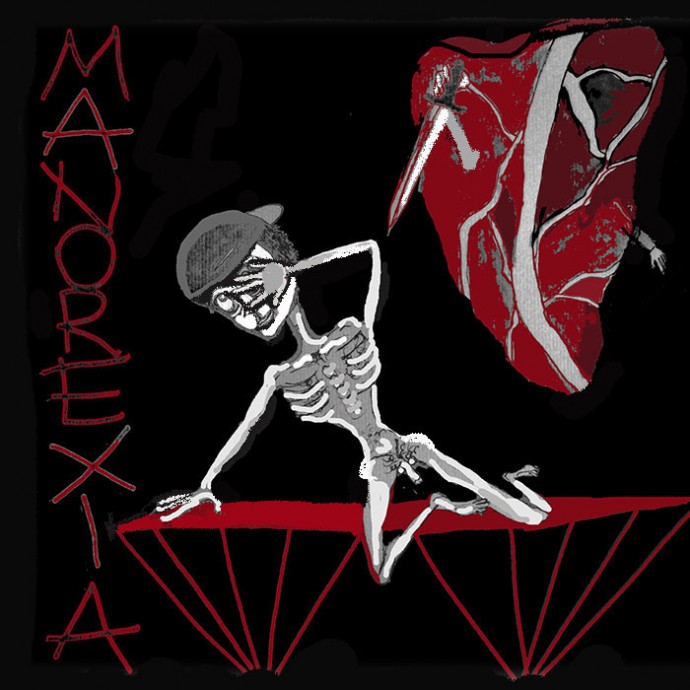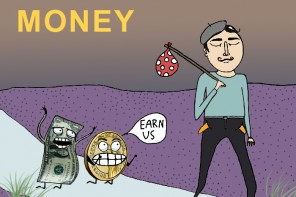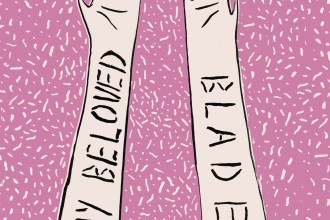From skinny top models to thigh-gap obsessions and the Barbie doll ideal, we are all aware of the pressure that society imposes on women with regards to their appearances. One of the most common disorders triggered as a result is anorexia, whose victims are 90% of the time females. But what about the men affected by the disease—are there societal causes for them as well? The image manorexics want to reflect is far removed from the strong, sinewy body with bulging biceps we’re used to seeing in magazines and on our TV screens. Manorexia is becoming more prevalent, showing that boys nowadays are also suffering from body image pressure. Twenty-one-year-old Ollie Roche, from Plymouth, Great Britain explains to us why and how his eating disorder started and how he managed to pull through.
I have been fighting a battle against anorexia for six years now. I turned twenty-one last January and I have the feeling that I will never entirely get rid of this disease; it will follow me wherever I go. I have just learned over time to deal with it more peacefully. Now I choose to speak out about my condition to discourage other people from letting eating problems spiral and take control of their lives.
My eating issues began at the age of five. At that time, my parents were breaking up, but that didn’t upset me as much as the fact that they underestimated my awareness of the situation. With this burden on my shoulders, I felt at a loss in life. One day, I had to stay for dinner at my grandma’s place. She was a farmhouse cook, so it meant lots of food. She served me two huge sausages, and as I was only a wee boy I started to feel extremely sick. Of course, I complained, but she didn’t allow me to leave the table until it was all gone. On top of the stress my parents’ separation imposed upon me, that evening was the straw that broke the camel’s back. From then on, I became a vegetarian and developed a phobia of sausages. This became my control mechanism, and thus, disordered eating. I also, along the way, developed mysophobia, a pathological fear of contamination.
The full-blown anorexia came later, when I was about fifteen. I always felt overweight, but that didn’t really upset me until I got bullied for my weight at my secondary school. The turning point came when I was in English class. The teacher was unhappy with my coursework so she threw it across the room and screamed in my face. I went home crying and something clicked in me; suddenly, my views towards food changed. I began to eat less and less and I rapidly lost weight. My habit of not finishing what was on my plate became a ritual, and I developed a fixation on my appearance, as well as a weight-loss obsession. Anorexia truly had a hold on me.
When there was food in front of me, I felt a mix of scared and angry, so I just turned it down a lot. I started worrying about the next breakfast every evening, whether there would be too much milk or food. I feared that whatever I ate would be a lot and I would put on weight. I was trying to take control of my life by refusing to eat. Ironically, the condition started to take control of me, and I became weaker—I was enslaved by my obsession with food. Over time it got a lot worse; I started eating just a slice of bread a day until I weighed only four-and-a-half stone at 5ft11. This had an impact on my education, as I completely lost my ability to concentrate at school. The lack of sustenance made it hard for me to understand what I was being taught. I started failing exams and eventually didn’t even go to school anymore.
When I looked at myself in the mirror I hated what I saw—an overweight, hideous boy—which was actually the opposite of the truth. I thought that my body was wide, my thighs too big. I was obsessed with looking like a male model and spent hours looking at catwalk pictures of skinny-looking men. Both the way I saw myself and the image I projected to others were important to me. I wasn’t able to walk down the street without getting attention, looks and comments. I got a lot of criticism, which was, in my eyes, a sign of my achievement; it felt like a triumph to be dubbed the skinniest man still able to walk in the city. Looking back, I realise how mad that was. I believe that society doesn’t cause eating disorders, but it definitely doesn’t help either. Anorexia is comorbid, which means that it exists with other psychological conditions. To develop an eating disorder, one must have high insecurity and low self-esteem, and probably also a traumatic childhood.
Living a day-to-day life with anorexia is tricky, especially as a teenager. Teenage years are the years to grow and find yourself, but anorexia masks that completely. Physically, my hormones were non-existent, and socially, I wasn’t able to take part in activities properly with my friends. They always wanted to go to McDonald’s during the day and would buy a package of doughnuts later—I would be offered one, but I simply felt in my heart that I couldn’t. Moreover, as a young man, my feeling of loneliness was amplified. I didn’t discuss my emotions to my mates as a girl would do. Females are more in touch with how they feel than men and are more open about themselves; with regards to eating disorders, this is still true.
When my anorexia started, I knew that something was wrong with my diet and eating habits, but I wasn’t able to tell exactly what. I discussed it with some people to have their opinions; I gave them hints by discussing my weight, unusual eating habits and low self-esteem, but no one quite clocked onto on it too well. It wasn’t until I was seen by a psychiatrist that the word anorexia was mentioned. As a teenager, I wasn’t very proactive about getting external support, but ultimately I chose to accept medical help thinking only of one thing: I didn’t want to waste my adult years as I had my teenage ones.
In October 2009, when I was sixteen years old, I was suffering from muscle wastage and low blood pressure and was eventually rushed to hospital. The doctor told me it was getting to the stage that, because I hadn’t eaten, my body was eating my organs and my heart was shrinking. He said I could die. I was terrified, but I needed to hear it. I’d felt like what I was doing was natural; I didn’t feel like I was harming myself. I stayed in the hospital for two months, with strict food plans, supervised meals, and counseling. I then continued the treatment at home with my mother, but was often supervised by psychiatrists at mealtimes. My family and I were battling the disorder every day, and I started to recover.
My mother and I created an eating disorder charity called No to Eating Disorders UK to highlight the issue and offer support. In southwest England there are no eating disorder units for teenagers, even though it has the highest rate of teenage girls admitted to hospitals for just that reason. Those suffering on a drastic level must be sent far away from home. We thereby aim to call an end to the ‘post code lottery’ for treatment, to enable young people to receive help within their community, and to increase awareness of how the condition can take hold. Our ultimate hope is a dedicated eating disorder unit for young people to be set up in Plymouth, where I am from.
To someone struggling, my advice would be to find ‘your own’ therapy. By which I mean, use therapy to help you with your specific aspirations. Spend time with the people who matter to you; travel; find a new way of life—any and all of these things can help you personally. Medical and mental carers always undertake scientific methods, but for most people that alone doesn’t work.
Over time I began to enjoy little snippets of a normal life for. Combined with the therapy, it kept spurring me on to achieve my goal of being like everyone else my age. It isn’t Groundhog Day like it used to be. Sure, I—like many—have blips, but there is always something to get back on track for. I believe anyone can find a reason to want fight.







